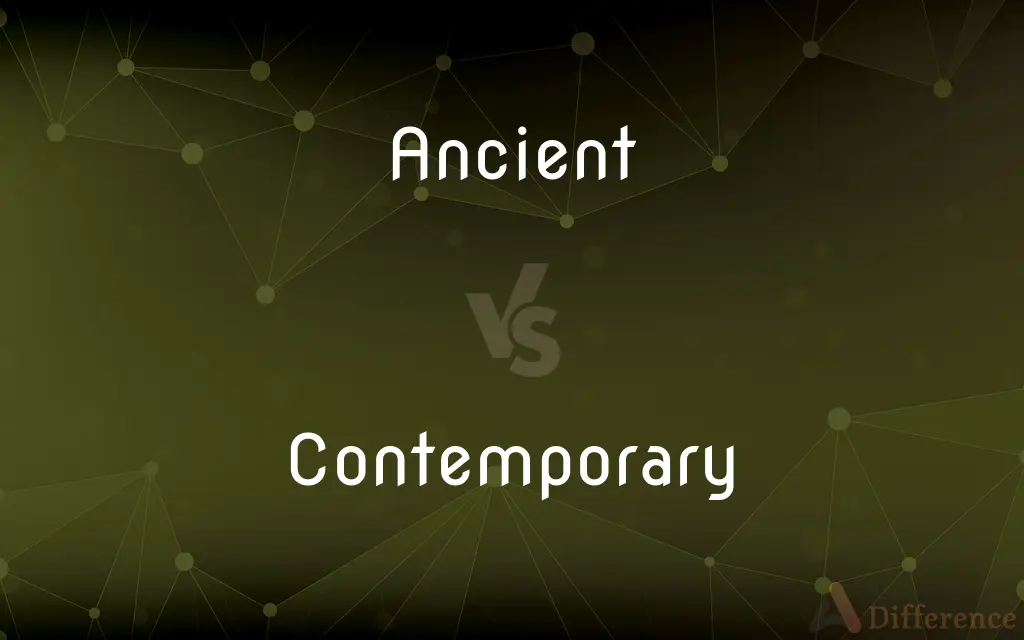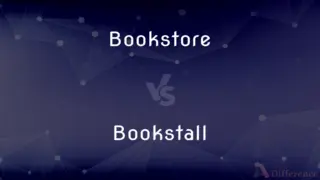Ancient vs. Contemporary — What's the Difference?
By Tayyaba Rehman & Fiza Rafique — Updated on April 17, 2024
Ancient refers to times long past, often thousands of years ago, emphasizing historical context and permanence, while contemporary denotes the current or recent times, highlighting current trends and relevance.

Difference Between Ancient and Contemporary
Table of Contents
ADVERTISEMENT
Key Differences
Ancient civilizations like the Egyptians and Romans developed foundational practices and technologies, while contemporary societies build upon and refine these ancient innovations.
Ancient art often reflects religious or mythological themes, utilizing natural materials and manual techniques, whereas contemporary art embraces diverse themes including abstract and conceptual ideas, often using modern technology like digital media.
In literature, ancient texts, such as Homer’s epics, focus on heroic deeds and moral lessons, while contemporary literature often explores complex characters and social issues, reflecting modern sensibilities.
In architecture, ancient buildings like the Parthenon are characterized by their use of durable materials like stone and are revered for their historical and cultural significance, on the other hand, contemporary architecture often focuses on sustainability, the use of new materials like glass and steel, and innovative design.
While ancient philosophies provide the groundwork for many modern disciplines, examining universal truths and moral questions, contemporary philosophy often tackles issues like artificial intelligence and bioethics, reflecting technological advancements and current challenges.
ADVERTISEMENT
Comparison Chart
Time Frame
Thousands of years ago
Current or recent times
Art Themes
Religious, mythological
Abstract, conceptual, social issues
Technology
Natural materials, manual techniques
Digital media, modern technology
Literature Focus
Heroic deeds, moral lessons
Complex characters, modern sensibilities
Architectural Focus
Durability, historical significance
Sustainability, innovative design
Compare with Definitions
Ancient
Belonging to the very distant past.
The ancient ruins of Machu Picchu continue to attract tourists.
Contemporary
Existing or occurring in the present time.
Contemporary issues like climate change are pressing.
Ancient
Pertaining to the historical period before the Middle Ages.
Ancient Greece is known for its philosophers and mathematicians.
Contemporary
Modern or current in style.
The gallery features contemporary art.
Ancient
Traditional or inherited from the past.
The festival follows ancient customs.
Contemporary
A person living during the same period as another.
She is studying the works of her contemporaries.
Ancient
Extremely old or outdated.
They replaced the ancient furnace in the old house.
Contemporary
Belonging to the same time.
Picasso and Matisse were contemporaries.
Ancient
Former; previous.
The ancient capital of the empire was overthrown centuries ago.
Contemporary
Of the present; modern.
Contemporary designs emphasize minimalism and functionality.
Ancient
Belonging to the very distant past and no longer in existence
The ancient civilizations of the Mediterranean
Contemporary
Living or occurring at the same time
The event was recorded by a contemporary historian
Ancient
An old man
A solitary ancient in a tweed jacket
Contemporary
Belonging to or occurring in the present
The tension and complexities of our contemporary society
Ancient
A standard, flag, or ensign.
Contemporary
A person or thing living or existing at the same time as another
He was a contemporary of Darwin
Ancient
Of, relating to, or belonging to times long past, especially before the fall of the Western Roman Empire (AD 476)
Ancient cultures.
Contemporary
Belonging to the same period of time
A fact documented by two contemporary sources.
Ancient
Of great age; very old
"The males live up to six months—positively ancient, for a bee" (Elizabeth Royte).
Contemporary
Of about the same age.
Ancient
(Archaic) Having the qualities associated with age, wisdom, or long use; venerable
"You seem a sober, ancient Gentleman by your habit" (Shakespeare).
Contemporary
Current; modern
Contemporary trends in design.
Ancient
A very old person.
Contemporary
One of the same time or age
Shelley and Keats were contemporaries.
Ancient
A person who lived in times long past.
Contemporary
A person of the present age.
Ancient
The peoples of the classical nations of antiquity.
Contemporary
From the same time period, coexistent in time; contemporaneous.
Ancient
The ancient Greek and Roman authors.
Contemporary
Modern, of the present age (shorthand for ‘contemporary with the present’).
Ancient
(Archaic) An ensign; a flag.
Contemporary
Someone or something living at the same time, or of roughly the same age as another.
Cervantes was a contemporary of Shakespeare.
The early mammals inherited the earth by surviving their saurian contemporaries.
Ancient
(Obsolete) A flag-bearer or lieutenant.
Contemporary
Something existing at the same time.
Ancient
Having lasted from a remote period; having been of long duration; of great age, very old.
An ancient city
An ancient forest
Contemporary
(dated) A rival newspaper or magazine.
Ancient
Existent or occurring in time long past, usually in remote ages; belonging to or associated with antiquity; old, as opposed to modern.
An ancient author
An ancient empire
Contemporary
Living, occuring, or existing, at the same time; done in, or belonging to, the same times; contemporaneous.
This king [Henry VIII.] was contemporary with the greatest monarchs of Europe.
Ancient
(history) Relating to antiquity as a primarily European historical period; the time before the Middle Ages.
Contemporary
Of the same age; coeval.
A grove born with himself he sees,And loves his old contemporary trees.
Ancient
(obsolete) Experienced; versed.
Contemporary
One who lives at the same time with another; as, Petrarch and Chaucer were contemporaries.
Ancient
(obsolete) Former; sometime.
Contemporary
A person of nearly the same age as another.
Ancient
A person who is very old.
Contemporary
A person of nearly the same age as another
Ancient
A person who lived in ancient times.
Contemporary
Characteristic of the present;
Contemporary trends in design
The role of computers in modern-day medicine
Ancient
One of the senior members of the Inns of Court or of Chancery.
Contemporary
Belonging to the present time;
Contemporary leaders
Ancient
(obsolete) A senior; an elder; a predecessor.
Contemporary
Occurring in the same period of time;
A rise in interest rates is often contemporaneous with an increase in inflation
The composer Salieri was contemporary with Mozart
Ancient
A flag, banner, standard or ensign.
Ancient
The bearer of a flag; ensign
Ancient
Old; that happened or existed in former times, usually at a great distance of time; belonging to times long past; specifically applied to the times before the fall of the Roman empire; - opposed to modern; as, ancient authors, literature, history; ancient days.
Witness those ancient empires of the earth.
Gildas Albanius . . . much ancienter than his namesake surnamed the Wise.
Ancient
Old; that has been of long duration; of long standing; of great age; as, an ancient forest; an ancient castle.
Remove not the ancient landmarks, which thy fathers have set.
An ancient man, strangely habited, asked for quarters.
Ancient
Known for a long time, or from early times; - opposed to recent or new; as, the ancient continent.
A friend, perhaps, or an ancient acquaintance.
Ancient
Dignified, like an aged man; magisterial; venerable.
He wrought but some few hours of the day, and then would he seem very grave and ancient.
Ancient
Experienced; versed.
Though [he] was the youngest brother, yet he was the most ancient in the business of the realm.
Ancient
Former; sometime.
They mourned their ancient leader lost.
Ancient
Those who lived in former ages, as opposed to the moderns.
Ancient
An aged man; a patriarch. Hence: A governor; a ruler; a person of influence.
The Lord will enter into judgment with the ancients of his people, and the princes thereof.
Ancient
A senior; an elder; a predecessor.
Junius and Andronicus . . . in Christianity . . . were his ancients.
Ancient
One of the senior members of the Inns of Court or of Chancery.
Ancient
An ensign or flag.
More dishonorable ragged than an old-faced ancient.
Ancient
The bearer of a flag; an ensign.
This is Othello's ancient, as I take it.
Ancient
Belonging to times long past especially of the historical period before the fall of the Western Roman Empire;
Ancient history
Ancient civilizations such as those of the Etruscans and Sumerians
Ancient Greece
Ancient
Very old;
An ancient mariner
Common Curiosities
Are contemporary technologies influenced by ancient innovations?
Yes, many contemporary technologies are built upon or inspired by ancient innovations, such as architectural techniques or basic mathematics.
Can "ancient" refer to non-historical contexts?
Yes, "ancient" can describe anything very old or outdated, not limited to historical contexts.
What are some key characteristics of ancient art?
Ancient art is often religious or mythological, focused on symbolism and made with natural materials.
How do "contemporary" styles differ from "modern" styles?
Contemporary styles refer to those currently in vogue, often changing, whereas modern styles refer to a specific historical design movement around the 20th century.
What is considered "ancient" history?
Ancient history refers to the period from the earliest recorded human history until the early Middle Ages, approximately the 5th century.
How is contemporary literature different from ancient literature?
Contemporary literature often explores current societal issues and personal narratives, unlike ancient literature which focused on epic tales and moral lessons.
What is a contemporary issue that has ancient roots?
Government and democracy are contemporary issues with roots in ancient civilizations like Greece and Rome.
Can contemporary music include influences from ancient music?
Yes, contemporary music can incorporate elements from ancient music traditions, creating a blend of old and new styles.
What role does ancient philosophy play in contemporary education?
Ancient philosophy still forms a core part of contemporary education, particularly in courses dealing with ethics, politics, and logic.
How do contemporary philosophical questions differ from ancient ones?
Contemporary philosophy often deals with issues arising from new technologies and modern life, whereas ancient philosophy was more focused on morality and the natural world.
How does contemporary architecture utilize technology differently from ancient architecture?
Contemporary architecture often incorporates advanced technologies for sustainability and aesthetics, unlike the more material-focused ancient architecture.
Share Your Discovery

Previous Comparison
Bookstore vs. Bookstall
Next Comparison
Spelt vs. EinkornAuthor Spotlight
Written by
Tayyaba RehmanTayyaba Rehman is a distinguished writer, currently serving as a primary contributor to askdifference.com. As a researcher in semantics and etymology, Tayyaba's passion for the complexity of languages and their distinctions has found a perfect home on the platform. Tayyaba delves into the intricacies of language, distinguishing between commonly confused words and phrases, thereby providing clarity for readers worldwide.
Co-written by
Fiza RafiqueFiza Rafique is a skilled content writer at AskDifference.com, where she meticulously refines and enhances written pieces. Drawing from her vast editorial expertise, Fiza ensures clarity, accuracy, and precision in every article. Passionate about language, she continually seeks to elevate the quality of content for readers worldwide.














































